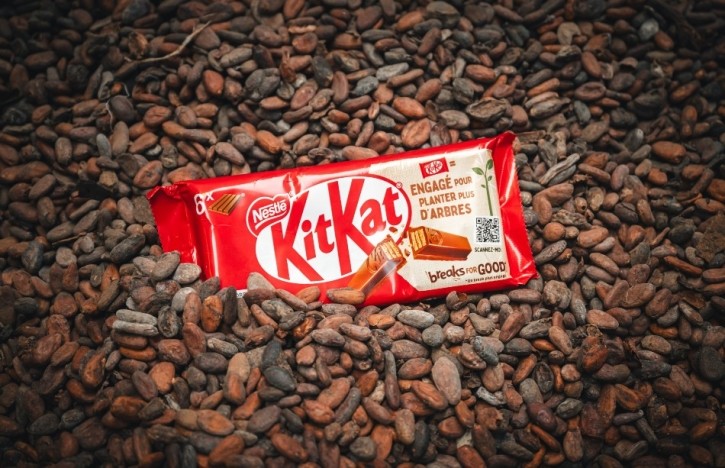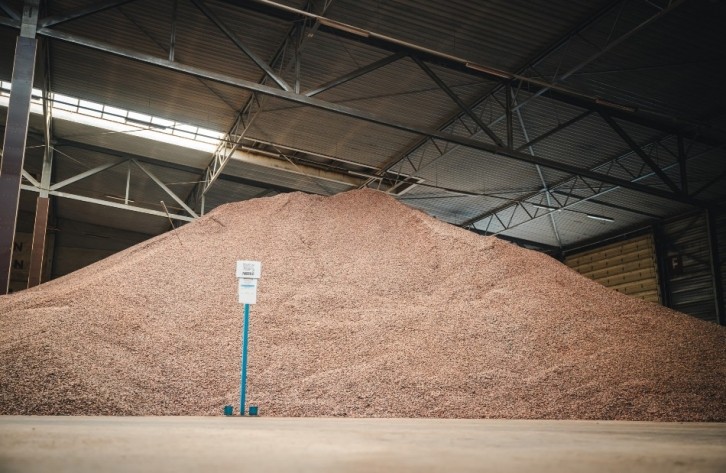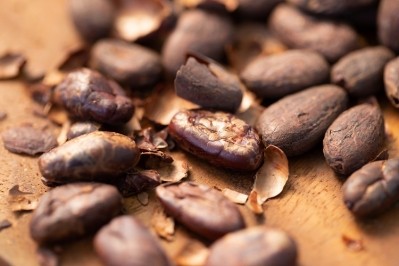Sustainability
Breaking good: First KitKat using cocoa from the Nestlé Income Accelerator launches in Europe

Famous for its marketing catchphrase, ‘Have a break – have a KitKat’, the new sustainable initiative that helps close the living income gap of cocoa-farming families and reduce child labour risk in its supply chain, will be identified on a variation of the slogan: ‘Breaks for Good’.
The European launch of the programme took place at Nestlé’s Hamburg factory where most of the iconic bars are now produced. The IAP was established in January 2022 to raise awareness about the sustainability of cocoa mass from beans grown by farmer families engaged in the programme.
At the same time, it strives to advance better agriculture practices and promote gender equality, empowering women as agents for positive change. The programme incentivizes cocoa-farming families that enroll their children in school, implement good agricultural practices, engage in agroforestry activities, and diversify their incomes.
Traceability standards
Nestlé said the cocoa mass from the income accelerator programme adheres to one of the highest traceability standards, ensuring "mixed identity preserved" traceability, enabling cocoa to be traced and stored separately.
The company also plans to use segregated cocoa butter, the other ingredient in chocolate bars, for all of its KitKats in Europe from the middle of this year, with plans to expand to other regions in the coming years.
“KitKat has consistently embraced innovation, centred around its iconic ‘Have a break, Have a KitKat’. Today, this innovation is brought to life through the ‘Breaks for Good’ initiative that puts cocoa farmers at the center of our product through our income accelerator program,” said Corinne Gabler, Head of Confectionery and Ice Cream at Nestlé. “We couldn’t think of a better brand than KitKat to represent our efforts to create meaningful impact in cocoa communities.”
Nestlé’s income accelerator programme has so far supported more than 10,000 families in Côte d’Ivoire and is expanding into Ghana later this year to include a total of 30,000 families. By 2030, the programme aims to reach an estimated 160,000 cocoa-farming families in Nestlé’s global cocoa supply chain to create an impact at scale.
Farmer income
The initiative has been launched against growing concerns that farmers in the two West African countries, who between them account for more than 70% of the world’s cocoa beans, have seen incomes, according to Oxfam research, decrease by 16% in the past three years due to global market fluctuations, this is despite existing premiums being paid farmers from certification schemes run by Fairtrade and Rainforest Alliance – and a Living Income Differential (LID) payment of $400 per metric ton (MT) on all cocoa sales from Cote d'Ivoire and Ghana.
Darrell High, Global Cocoa Manager, Nestlé, said the company calculated that a typical cocoa-growing family in West Africa requires roughly $6,300 a year to live on. “Typically a family back in January 2022 was making $3,000 a year per family, so there's a gap of about three and a half thousand for a living income.”
He said the IAP builds on Nestlé’s Cocoa Plan, the company’s in-house sustainability scheme, that has been running for 15 years to create a fully traceable supply chain. He explained to ConfectioneryNews that it has three pillars of action. “Firstly, better farming - and improving the farming practices to improve yield and improve income. It also improves the environmental credentials of the farm.
“The Second pillar is about improving the lives of the women and children, and under the third pillar, it is about transforming the supply chain of the cocoa from one that's bought as a commodity to one that's built on long-term relationships, right back to the farmer, creating long term relationships and a transparent supply of cocoa - so it's also a transformation of our cocoa supply.”
If all measures are fulfilled, cocoa farmers' families will receive an additional €100. The cocoa farmers' families receive up to €500 annually for the first two years and then €250 annually. The reports from Nestlé suppliers show that since January 2022, the cocoa farmers’ families participating in the programme have received an estimated €2 million in incentives
Nestlé said it has collaborated with various partners and suppliers to transform its global cocoa sourcing and achieve full traceability and physical segregation of the cocoa sourced for its income accelerator programme. This will allow the company to track the entire journey of cocoa beans from origin to factory while keeping them physically separated from other cocoa sources.
Child labour
The company imports approximately 350,000 tonnes of cocoa a year, of which more than 80% came from the Nestlé Cocoa Plan in 2023. In 2024, an estimated 45,00 tonnes will be segregated in its supply chain and assigned to the income accelerator programme. The beans from the Nestlé income accelerator arrive in Hamburg in their own container, tracked with a Cargill barcode so every stage of the product’s journey will be documented in the Rainforest Alliance certification platform, providing visibility through the chain."
Alexander von Maillot, CEO of Nestlé Germany, said: “The income accelerator is about providing the support and the incentive to help them [cocoa farmers] make really key changes in the running of the household and the farm.”
He said one of the key parts of the IAP is to eliminate the use of child labour in the company’s supply chain: “It really goes to the heart that with this programme that we take in especially the risks of child labour because we don't want any child working … It's a much more realistic programme than what we had in the past, really enabling families to have a better income so that children can to go to school.”
von Maillot said the IAP offers financial incentives to farmers to improve agricultural practices on the farm, better pruning for example, or growing other fruit trees, and improving the environmental credentials of the land. There is financial support to send children to school, instead of having them work on the farm, and elements to encourage other sources of income.
“So taking a typical farming household…they want the best for their children, but we know they’re struggling in the face of the issues like climate change, cocoa pod disease, and the global economy.”
High said that the company wants all children between six and 16 to be enrolled in and attending school.
“So, what we're doing is things like providing school kits for the children, birth certificates and we've been building schools - we've built 68 schools over the last 15 years in Cote d'Ivoire.”
“Another crucial element of the IAP is the importance of women. What we're doing is really helping the women firstly by helping set up village savings and loans associations (VSLAs), and then we add gender training to that for the household. We are also using mobile money to help modernise the economy and become less reliant on cash payments.
“Because the cash payments are more auditable and traceable, it also means that we know we can really make sure that the money we're paying our suppliers is then going from them directly to the correct cocoa farming families and we really wanted to make sure that the women were really key to this. So, we make sure that half the incentive is paid to the women and half to the farmer.”
High said that as well as the Rainforest Alliance certification, the programme is also evaluated by the independent KIT Royal Tropical Institute.
Rainforest Alliance
Thierry Touchais, Rainforest Alliance’s organisation’s Strategic Accounts Manager, said: “It's encouraging to find a company of this scale using a ‘mixed identity preserved’ model in which cocoa can be traced back to Rainforest Alliance certified farmers engaged in Nestlé's income accelerator. The approach showcases the potential for positive change in the industry.”
He explained that the Rainforest Alliance’s role is twofold. “We work on the supply side, helping farmers and workers on the ground be more sustainable, and on the demand side, helping companies like Nestlé source more sustainable ingredients and understand their impact. This puts us in a unique position to support Nestlé in this project."
von Maillot also explained the reason why the factory in Hamburg was chosen as the venue for the media launch of the IAP. "It’s because it has been a key operation for Nestlé for the past 50 years, producing over 4 million KitKat bars a day and exporting them to 26 countries. “
KitKats are still produced at the York factory in the UK, where the chocolate bar was invented in 1935 and a factory in Sofia.
Cargill is another of the main partners committed to supporting Nestlé's longer-term goals and its progress on delivering the IAP for its chocolate brands. It stores the cocoa in its warehouse at the Hamburg port.
Cargill
Michiel van der Bom, Product Line Director Cocoa & Chocolate Europe West Africa, Cargill, said: “As a partner on Nestlé’s sustainability journey, we are implementing solutions to source sustainable ingredients for Nestlé in ways that help restore the environment, support families, and increase incomes. Through our partnership, we are building a stronger, more resilient supply chain together.
He said that as well as sourcing cocoa on Nestlé’s behalf, Cargill is also responsible for implementing the various sustainable incentives in the IAP and, along with the Rainforest Alliance and Nestlé’s own sustainability team, constantly monitor the cocoa chain for complete transparency.
“It's key that we have a strong working and learning relationship with Nestlé so that we also learn how to implement programmes better,” he said.
He also confirmed that with the adoption of better agricultural practices such as pruning, Cargill is also noticing an increase in production from some cocoa farmers.
The KitKat ‘Breaks for Good’ will be available on store shelves from this month in 27 European countries and from May 2024 in the UK. In addition, a limited-edition KitKat, with 70% dark chocolate that is also made with cocoa sourced from the income accelerator, has been launched in the UK market as a pilot.

















